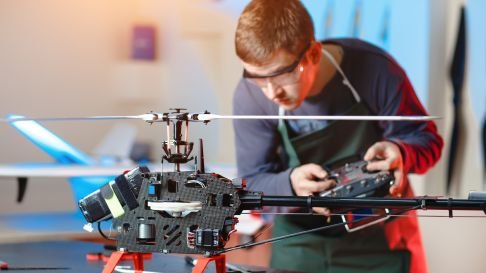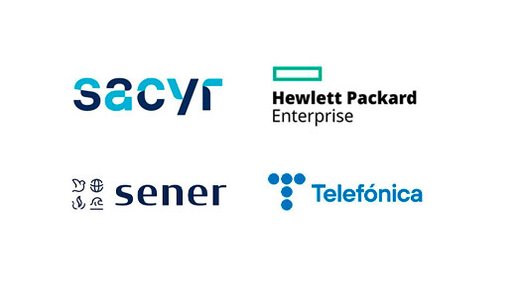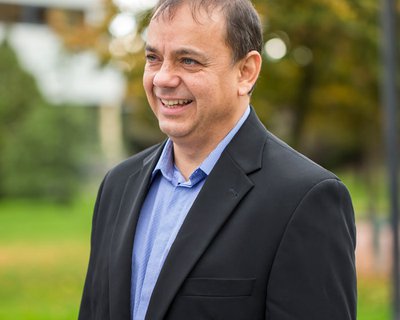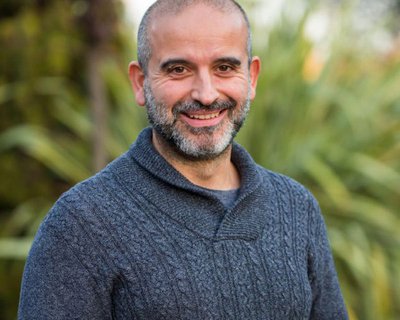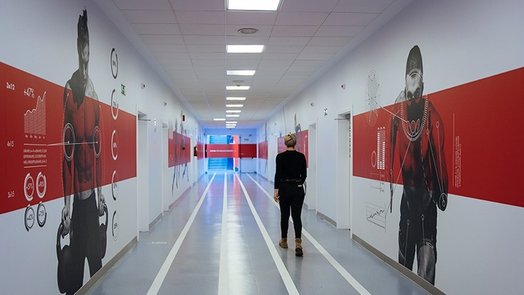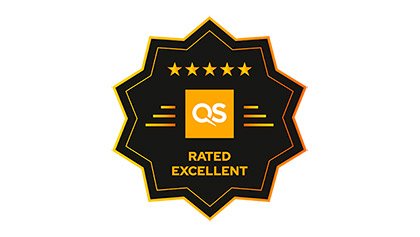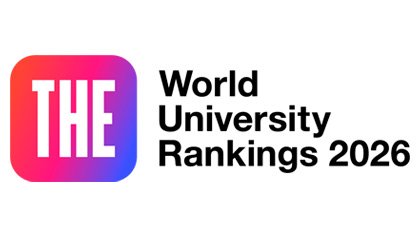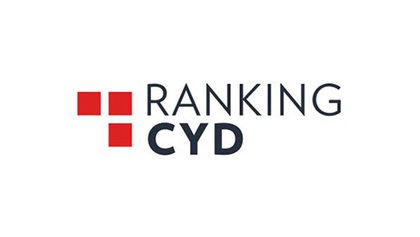-50% Discount on place reservation for 26/27 intake until February 28th!
Aerospace Engineering Degree
The Degree in Aerospace Engineering at Universidad Europea is a regulated degree, designed to train future aerospace engineers through a multidisciplinary curriculum. Our graduates of the Degree in Aerospace Engineering will have multiple options to work in various sectors, including, for example, in engineering, public functions, or the area of research and teaching.
Throughout the four-year degree, comprised of 240 ECTS credits, you will have cutting-edge facilities such as the wind tunnel and the new Industry 4.0 space to simulate experiments and projects in a professional environment like the one you will find in your future. In addition, you will have the chance to complete internships and work placements, learning from the very best in the industry.
Official degree issued by Universidad Europea de Madrid
| Campus-based | Classes in English | Villaviciosa de Odón | 4 Years, 240 ECTS | Start: 14 sep. 2026 | School of Architecture, Engineering, Science and Computing - STEAM |
Testimonials
Study plan
Learn with our Experiential Learning model by working on your own projects with leading companies. Just imagine receiving a prize before you graduate, just like our students who were the finalists in the ‘Airbus Fly your Ideas’ competition with the project ‘Flying Dreams’. This Degree prepares for Aeronautical Tecnhical Engineer. Order CIN/308/2009.
Syllabus
Offered in the current academic course.
Haz click para consultar el plan de estudios 2019 en extinción
Programa de estudios
1º (implantación curso 24/25)
| Materia | ECTS | Tipo | Idioma de impartición |
|---|---|---|---|
| Calculus I | 6 | Basic | English (en) |
| Physical Foundations for Engineering I | 6 | Basic | English (en) |
| Computer Science for Engineering | 6 | Basic | English (en) |
| Technical Drawing | 6 | Mandatory | English (en) |
| Chemistry for Engineering | 6 | Basic | English (en) |
| Algebra | 6 | Basic | English (en) |
| Aerospace Technology | 6 | Basic | English (en) |
| Calculus II | 6 | Basic | English (en) |
| Physical Foundations for Engineering II | 6 | Basic | English (en) |
| Organization and Management of Aerospace Companies | 6 | Basic | English (en) |
2º (implantación curso 25/26)
| Materia | ECTS | Tipo | Idioma de impartición |
|---|---|---|---|
| Thermodynamics and Heat Transfer | 6 | Mandatory | English (en) |
| Mechanics | 6 | Mandatory | English (en) |
| Materials Science | 6 | Mandatory | English (en) |
| Calculus III | 6 | Mandatory | English (en) |
| Navigation Systems I | 6 | Mandatory | English (en) |
| Fluid Mechanics I | 6 | Mandatory | English (en) |
| Statistics | 6 | Basic | English (en) |
| Resistance of Materials and Mechanical Elasticity | 6 | Mandatory | English (en) |
| Navigation Systems II | 6 | Mandatory | English (en) |
| History, Exercise and Professional Deontology | 6 | Mandatory | English (en) |
3º (implantación curso 26/27)
| Materia | ECTS | Tipo | Idioma de impartición |
|---|---|---|---|
| Entrepreneurial Leadership | 6 | Mandatory | English (en) |
| Aerospace Production and Projects | 6 | Mandatory | English (en) |
| Fluid Mechanics II | 6 | Mandatory | English (en) |
| Mechanical and Graphic Design | 6 | Mandatory | English (en) |
| Aeronautical Structures | 6 | Mandatory | English (en) |
| Air Transport | 6 | Mandatory | English (en) |
| Flight Mechanics | 6 | Mandatory | English (en) |
| Space Vehicles and Missiles | 6 | Mandatory | English (en) |
| Maintenance and Certification of Aerospace Vehicles | 6 | Mandatory | English (en) |
| Aerodynamics | 6 | Mandatory | English (en) |
4º (implantación curso 27/28)
| Materia | ECTS | Tipo | Idioma de impartición |
|---|---|---|---|
| Aeroelasticity and Vibrations | 6 | Mandatory | English (en) |
| Propulsion Systems | 6 | Mandatory | English (en) |
| Aircraft Design | 6 | Mandatory | English (en) |
| Satellite Design | 6 | Mandatory | English (en) |
| Professional Intership I | 6 | PAE | English (en) |
| Professional Intership II | 6 | PAE | English (en) |
| Graduation Project | 12 | TFG | English (en) |
| Elective 1 | 6 | Elective | English (en) |
| Elective 2 | 6 | Elective | English (en) |
Programa de estudios
1º (finalización de impartición curso 26/27)
| Materia | ECTS | Tipo | Idioma de impartición |
|---|---|---|---|
| Calculus I | 6 | BASICA | Inglés (en) |
| Physical Foundations for Engineering I | 6 | BASICA | Inglés (en) |
| Computer Science for Engineering | 6 | BASICA | Inglés (en) |
| Technical Drawing | 6 | BASICA | Inglés (en) |
| Chemistry for Engineering | 6 | BASICA | Inglés (en) |
| Algebra | 6 | BASICA | Inglés (en) |
| Aerospace Technology | 6 | OBLIGATORIA | Inglés (en) |
| Organization and Management of Aerospace Companies | 6 | BASICA | Inglés (en) |
| Calculus II | 6 | BASICA | Inglés (en) |
| Physical Foundations for Engineering II | 6 | BASICA | Inglés (en) |
2º (finalización de impartición curso 27/28)
| Materia | ECTS | Tipo | Idioma de impartición |
|---|---|---|---|
| Thermodynamics and Heat Transfer | 6 | OBLIGATORIA | Inglés (en) |
| Mechanics | 6 | OBLIGATORIA | Inglés (en) |
| Materials Science | 6 | OBLIGATORIA | Inglés (en) |
| Modern Language | 6 | OBLIGATORIA | Inglés (en) |
| Navigation Systems I | 6 | OBLIGATORIA | Inglés (en) |
| Fluid Mechanics I | 6 | OBLIGATORIA | Inglés (en) |
| Statistics | 6 | BASICA | Inglés (en) |
| Resistance of Materials and Mechanical Elasticity | 6 | OBLIGATORIA | Inglés (en) |
| Navigation Systems II | 6 | OBLIGATORIA | Inglés (en) |
| History, Exercise and Professional Deontology | 6 | OBLIGATORIA | Inglés (en) |
3º (finalización de impartición curso 28/29)
| Materia | ECTS | Tipo | Idioma de impartición |
|---|---|---|---|
| Entrepreneurial Leadership | 6 | OBLIGATORIA | Inglés (en) |
| Aerospace Production and Projects | 6 | OBLIGATORIA | Inglés (en) |
| Fluid Mechanics II | 6 | OBLIGATORIA | Inglés (en) |
| Mechanical and Graphic Design | 6 | OBLIGATORIA | Inglés (en) |
| Aeronautical Structures | 6 | OBLIGATORIA | Inglés (en) |
| Air Transport | 6 | OBLIGATORIA | Inglés (en) |
| Flight Mechanics | 6 | OBLIGATORIA | Inglés (en) |
| Space Vehicles and Missiles | 6 | OBLIGATORIA | Inglés (en) |
| Maintenance and Certification of Aerospace Vehicles | 6 | OBLIGATORIA | Inglés (en) |
| Aerodynamics | 6 | OBLIGATORIA | Inglés (en) |
4º (finalización de impartición curso 29/30)
| Materia | ECTS | Tipo | Idioma de impartición |
|---|---|---|---|
| Aeroelasticity and Vibrations | 6 | OBLIGATORIA | Inglés (en) |
| Propulsion Systems | 6 | OBLIGATORIA | Inglés (en) |
| Aircraft Design | 6 | OBLIGATORIA | Inglés (en) |
| Satellite Design | 6 | OBLIGATORIA | Inglés (en) |
| Professional Intership I | 6 | OBLIGATORIA | Inglés (en) |
| Professional Intership II | 6 | OBLIGATORIA | Inglés (en) |
| Graduation Project | 12 | OBLIGATORIA | Inglés (en) |
| Aerospace Production Systems | 6 | OPTATIVA | Inglés (en) |
| Multidisciplinarity I | 6 | OPTATIVA | Inglés (en) |
| Multidisciplinarity II | 6 | OPTATIVA | Inglés (en) |
| Professional Intership III | 6 | OPTATIVA | Inglés (en) |
Programme implementation
| Plan 2019 | Plan 2024 | ||
|---|---|---|---|
| Discontinuation 1st Year | Academic Year 26/27 | Implementation 1st Year | Academic Year 24/25 |
| Discontinuation 2nd Year | Academic Year 27/28 | Implementation 2nd Year | Academic Year 25/26 |
| Discontinuation 3rd Year | Academic Year 28/29 | Implementation 3rd Year | Academic Year 26/27 |
| Discontinuation 4th Year | Academic Year 29/30 | Implementation 4th Year | Academic Year 27/28 |
*If you need to enroll in a subject from the previous plan that is not available, you must switch to the new plan.
Number of places for incoming students
140.
Internships
Internships are a key component of your training. Acquiring experience after what you have learnt in your degree is the best way to enter the employment market. There are two types of internships: curricular—which are included in your study plan—and extracurricular—which you can do on a voluntary basis.
In order to complete curricular internships in companies, you will need to have 50% of the credits approved and to register the subject before starting your internship. These internships are monitored by the company and the internship coordinator, and interim and final reports are prepared for evaluation.
If you want to take your work experience to the next level before finishing your university education, you can pursue an extracurricular internship. You can do them in any academic year, but keep in mind that internships are a formative complement to your studies; therefore, the more knowledge you have acquired throughout your studies, the more you will benefit from the internship experience.
You do internships in companies such as the European Space Academy Center..., and participate in research projects and Workshops. This way you are assured a future in one of the three professions with the lowest unemployment in Spain.
Check the list of companies here.

Mobility offer
We have agreements with many universities in different continents so that you can choose the one that best suits your training.
Employability
Career opportunities with a degree in aerospace engineering
The Bachelor's Degree in Aerospace and Aircraft Engineering is a regulated degree, in which organizations look after the interests and professional attributions. It is a multidisciplinary profession, according to the current changing world, which allows you to launch into the professional world as soon as you finish your studies, or you can continue your training with a master's degree. Due to its characteristics, this degree has very high employability in leading companies in the sector.
Aeronautics and space (flight segment and earth segment)
- Satellite Design.
- Aircraft Builders and their Supply Chain.
- Engine Builders and their Supply Chain.
- Equipment and Systems Builders.
- Maintenance, Repair and Overhaul.
- Aircraft and Navigation Aids.
- Airport Infrastructures.
Public service
Opposition:
- Defence
- International Administration
- General State Administration
Teaching in technological centers
- Public Sector.
- Private Sector.
Admissions
Start your future at Universidad Europea
You can become a student at Universidad Europea in three easy steps.
1
Admission exams
Start your admission process by calling +34 918257503 or request information and our advisors will contact you.
2
Place reservation
Once you have been admitted, secure your place by paying the reservation fee.
3
Enrollment
Submit the required documents to formalise your enrollment.
Scholarships and financial aid
We want to help you. If you want to study at Universidad Europea, you will have at your disposal a wide selection of own and official scholarships.
Credit recognition and transfers
You don’t have to stick with something you don’t like. That’s why we’ve designed specific plans for credit recognition and transfers.
Request your online credit recognition review, transfer your academic file and start studying at Universidad Europea.
Profile for prospective students and how to access this degree
The recommended applicant profile is as follows:
- High School Diploma (Bachillerato) in Science and Technology
- Passion for aircrafts
- Curiosity to know "how it's done"
- Rigorous
- Responsible
- Creative
- Dedicated to acquiring new knowledge
Admissions requirements
The prerequisites to access this bachelor’s programme are those established in RD 1892/2008 of 14 November and current applicable legislation, namely:
- Students must have passed the University admissions exam, in accordance with applicable legislation.
- Students over the age of 25 and 45 must pass the alternative admissions exam.
- Graduates, undergraduates, technical engineers, engineers and architects.
- High school students in education systems from member states of the European Union and other countries with relevant international agreements with Spain may access this programme, provided that they have already qualified to enroll into universities in their own educational system.
- Students from countries that do not have relevant international agreements with Spain must have their studies officially recognised (through a process of ‘homologation’) and complete the university admission exam(s).
- Individuals over the age of 40 without a degree enabling them to access University, may also access this degree, provided they can demonstrate professional experience related to the programme to which they intend to apply.
The Access requires to the degree in 100% in English is a B2 level english language.
Open days
Join us at one of our Open Days and see for yourself how our educational methodology works, meet the faculty members who are already thinking of your future, get more information on the programs we offer, and find out how to begin your studies with us in the next academic year.
14 February
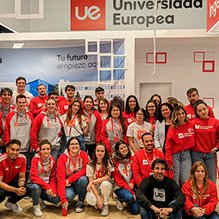
Come and see the campus
Get to know the facilities and discover why Universidad Europea is made for you.
Faculty
The faculty on this degree has 60% of doctors.
Our teaching staff
- Julio Gallegos Alvarado
Degree in Physical Sciences and PhD in Astrophysics. With more than 20 years of teaching experience in the field of Satellites Design and Space Vehicles and Missiles, and more than 25 years of research experience in the field of Cosmology (Cosmic Microwave Background) and radio instrumentation. ORCID: 0000-0001-5614-1767 - José Omar Martínez Lucci
Aeronautical Engineer and PhD in Engineering. With more than 16 years of teaching and research experience in the field of fluid mechanics and materials. “Physical chemistry of self-organization and self-healing in metals”. Physical chemistry Chemical Physics (2009) https://pubs.rsc.org/en/content/articlelanding/2009/cp/b912433k/unauth. ORCID: 0000-0002-7942-8645 - Almudena Vega Coso
Aeronautical Engineer and PhD in Aerospace Engineering. With more than 10 years of teaching experience in the field of Aeroelasticity in Turbomachinery, and more than 13 years of research experience in the field of Aeroelasticity and CFD. “The Low Reduced Frequency Limit of Vibrating Airfoils—Part I: Theoretical Analysis”. J. Turbomach. (2016) https://asmedigitalcollection.asme.org/turbomachinery/article-abstract/138/2/021004/378580/The-Low-Reduced-Frequency-Limit-of-Vibrating. ORCID: 0000-0002-4776-86457. - Ana Medina Palomo
Industrial Engineer and PhD in Mechanical Engineering in the field of fluid mechanics. With more than 6 years of teaching experience in mathematics and fluid mechanics. Research experience of more than 9 years in fluid mechanics, medical imaging and radiotherapy. - Daniel González Juárez
Aeronautical Engineer and PhD in Industrial Technologies. With more than 5 years of teaching experience in Aerodynamics, Fluid Mechanics and Computational Thermofluid Dynamics. More than 5 years of research experience in Aerodynamic Design. - José Manuel López López
Degree in Physical Sciences and PhD in Science and Technology of Colloids and Interfaces. More than 17 years of teaching experience in Physics, Mathematics and programming. More than 19 years of research experience in Complex Systems and Machine Learning. “Stability of binary colloids: kinetic and structural aspects of heteroaggregation processes”. Soft matter (2006) https://pubs.rsc.org/en/content/articlelanding/2006/SM/b608349h#!divCitation. ORCID: 0000-0003-1282-2645 - Ignacio Márquez López
Aeronautical Engineer, with more than 12 years of teaching experience in Advanced Aerospace Production Systems and Project Management. More than 6 years of research experience in Advanced Aerospace Production Systems and 5 patents in Advanced Production Systems: “Jig and Method of Manufacturing Aircraft Frames in a Composite Material”. International Patent Publication no. WO/2008/104614. World Intellectual Property Organization (2008). - Rafael Escalera Rivas
Industrial Engineer, with more than 9 years of teaching experience in mathematics and materials resistance. Trained in coaching and NLP. - Miguel Ángel Cosano de Arcos
Master’s Degree in Aeronautical and Airport Management, and expert course in investigation of air accident. More than 5 years of teaching experience in Air Transport and simulator instructor in Airbus aircraft. More than 30 years of professional experience as a military and commercial pilot. - Rafael Pax Dolz del Castellar
Aeronautical Engineer, with more than 9 years of teaching experience in Aeronautical Structures, Propulsion, Aircraft Certification and Maintenance. More than 35 years of professional experience at SENER, AERNNOVA, ACITURRI, Army Airmobile Forces, and is currently VP at DESTINUS. - Mariana Paula Arce García
Degree in Chemical Sciences and PhD in Chemical Sciences, with more than 11 years of teaching experience. Her field of knowledge is medicinal chemistry, drug synthesis and nanotechnology. More than 20 years of research experience in Medicinal Chemistry and Nanotechnology. “Neuroprotective and Cholinergic Properties of Multifunctional Glutamic Acid Derivatives for the Treatment of Alzheimer’s Disease”. J. Med. Chem. (2009) https://pubs.acs.org/doi/abs/10.1021/jm900628z; “Synergistic Antifungal Study of PEGylated Graphene Oxides and Copper Nanoparticles against Candida albicans”. Nanomaterial (2020) https://www.mdpi.com/2079-4991/10/5/819. ORCID: 0000-0001-5563-0745. With professional experience in the Department of Synthesis Institute of Organic Chemistry (IQOG-CSIC) and in the Institute of Medicinal Chemistry (IQM-CSIC). - Raul Carlos LLamas Sandin
Aeronautical Engineer, MSc in Aerospace Vehicle Design and Degree in Physical Sciences, with more than 11 years of teaching career in the field of Aeronautical Engineering, and more than 25 years of research and professional experience in a leading company in the industry Aerospace. - Victor Manuel Padrón
Industrial Engineer in the field of Industrial and Automatic Engineering, and PhD in Industrial Engineering. With more than 22 years of teaching experience in Systems Engineering and Electronic Systems, and more than 22 years of research experience in the field of Smart Cities and Social Inclusion, Internet of Things IoT, Intelligent Transportation, Health and Wellbeing, Educational Research, Climbing Robots, Movement Planning, Discrete Mathematics Algorithms, Robotic Cranes and Assembly Planning. “Social Inclusion in Smart Cities”. In: Augusto J.C. (eds) Handbook of Smart Cities. Springer, Cham. (2020); https://doi.org/10.1007/978-3-030-15145-4_42-1; “Smart Bus Stops as Interconnected Public Spaces for Increasing Social Inclusiveness and Quality of Life of Elder Users”. Smart Cities (2020); https://www.mdpi.com/2624-6511/3/2/23; “AUTMOD3: The integration of design and planning tools for automatic modular construction”. International Journal of Advanced Robotic Systems (2007). “A climbing autonomous robot for inspection applications in 3D complex environments”. Robotica (2000). ORCID: 0000-0002-9207-9320. - Artemia Loayza Arguelles
Materials Engineer and PhD in Materials Science and Engineering. She has more than 12 years of teaching and research experience in the field of materials science, composite materials and materials characterization. “Critical examination of chemically modified hybrid thermosets: Synthesis, characterization and mechanical behavior in the plateau regime of polyaminosiloxane-nitrile-DGEBA”. Polymer (2015). https://www.scopus.com/record/display.uri?eid=2-s2.0-84930939109&origin=inward&txGid=1e2af74abe70953bbf616f9427a72ca6. ORCID code: 0000-0001-5146-8269. - David García Nieto
Graduated in Physics. Master's in Energy. Master's in Secondary Education and Baccalaureate Teacher Training. PhD in Atmospheric Sciences in the Atmospheric Chemistry and Climate (AC2) group of the Spanish National Research Council (CSIC). Research on the atmosphere in urban and remote climates. High school teacher before joining the university. Professor at the School of Architecture, Engineering, and Design at UEM since March 2022, teaching courses in Calculus, Mathematics, Physics, and Statistics in the areas of Engineering, Architecture, and Business Administration. - Janaina Cejudo Sanche
Bachelor's Degree in Biology from Universidad Complutense of Madrid, and in Biotechnology from the Universidad Europea of Madrid. PhD in Molecular Biosciences from the Universidad Autónoma of Madrid. Professor at the School of Architecture, Engineering, and Design at UEM since the 2023-24 academic year, teaching Chemistry courses in the industrial, aerospace, and biomedical areas. Researcher in the "NanoUEM" group in the field of biomolecule immobilization on nanoparticles of different natures. Pre- and postdoctoral researcher at the Institute of Catalysis and Petrochemistry (ICP) of the CSIC, in the Enzyme Engineering group. Expert in protein immobilization on solid supports, creation of biocatalysts, and their application in reactions of industrial interest. - Andrea Galán Salazar
Industrial Engineer and PhD in Materials Science and Engineering from UC3M. Professor at the School of Architecture, Engineering, and Design at UEM since 2020, teaching courses in the areas of mechanics, materials, and manufacturing. Researcher in the "Advanced Materials for Engineering" group. - Emma Celeste Lope Retuerto
Aeronautical Engineer from UEM. Professor at the School of Architecture, Engineering, and Design since 2022, teaching courses in Aerospace (History and Deontology), Sciences (Calculus I and II), and Skills (Impact and Relational Influence). Head of innovation programs applied to the aeronautical sector and other transportation industries. - Guillermo Castilla Cebrián
PhD in Civil Engineering from Universidad Politécnica of Madrid. Master's Degree in Civil Engineering Systems, specializing in Transportation and Territory. Doctoral specialty in statistical transportation systems applied to conventional Spanish roads. - Héctor Eloy Sánchez Sardi
PhD in Automation, Robotics, and Vision from the Universidad Politécnica of Catalonia, conducting research on fault diagnosis, life prediction of wind turbine blades, and their integration with predictive control of wind turbines. He is an Engineer in Automation and Industrial Electronics with a Master's in Automation and Industrial Computing from the Universidad Politécnica of Valencia. He has professional experience in the fields of wind turbine control, control of active tilt systems in trams, and real-time testing/simulation of control algorithms. He completed a postdoc at the Fraunhofer SCAI research institute in Germany, focusing on data analysis for anomaly detection in wind turbines, anticipatory control of wind turbines under extreme multidirectional wind gusts, and the integration of maintenance optimization and control schemes for wind turbines. During his PhD, he had the opportunity to collaborate and conduct research at international centers such as NASA Ames Research Center in the United States and Aalborg University in Denmark. During his Master's, he collaborated on research in the fault diagnosis laboratory of the Institute of Automation and Industrial Computing (ai2) at the Polytechnic University of Valencia. He currently teaches in the Bachelor's Degrees in Industrial Systems Engineering and Aerospace Engineering in Aircraft at the European University of Madrid, covering subjects such as Automatic Control, Control Engineering, Robotics in Aerial and Marine Systems, Integrative Project in Automation and Control, and Computing for Engineering. - Diego Rubén Rodríguez
Diego has more than 15 years of teaching experience in different universities in Spain, Finland, and Germany, having worked in University of Zaragoza, Universidad Católica de Avila, UC3M, UCJC and currently in Universidad Europea de Madrid.
Apart from that Diego has over 20 years of experience, demostrating a proven track record in driving business growth and creating long-term value across sectors such as Technology, Industry, and Healthcare Consultancy, spanning several countries.
Currently serving as Chief Technical Officer and Co-Founder at Futuro Perfecto, a EU funding consultancy firm, he specializes in advancing business initiatives and strategic partnerships.
Previously, Diego co-founded Optimitive, an AI firm specializing in Energy, and held leadership roles including Managing Director of EU Programmes at Evalue Innovation. He also served as Head of Collaborative Programmes and Senior Innovation Consultant at Inspiralia. Diego's career began in research and development, with roles as Project Manager at Tecnalia and Ikerlan in the Basque Country. He holds a PhD in Computer Science (Artificial Intelligence), a Master’s in Project Management, and a Bachelor’s in Mathematics.
Excellence endorsed by the best
Frequently Asked Questions
Is aerospace engineering a bachelor degree?
Yes!
At Universidad Europea, our degree in aerospace engineering is designed to equip you with the skills for a career in the industry - anything from satellite design, aircraft building and maintenance, to airport infrastructure, and design of navigation equipment.
It is a four year program, consisting of 240 ECTS, that will see you not only make the most of the incredible facilities on campus, but also complete work placements and internships at some of the biggest organistions in the sector, gaining valuable knowledge even before you graduate.
Is aerospace engineering hard?
Like any program at Universidad Europea, our study plan on the degree in aerospace engineering is rigorous and challenging. But our aim is to ensure you are best prepared to enter the workforce with the skills and knowledge required.
Our professors are all experts in their areas of knowledge and will support and guide you through the program. You will also be able to get to know life in the workplace thanks to internships and placements.
What can you do with an aircraft engineering degree?
There are many options for career choices once you graduate from the degree in aircraft engineering. Many of our former students go on to enjoy successful roles in the sector, while others go into different areas such as public service or teaching.
These are just an example of some of your options:
- Satellite Design.
- Aircraft Builders and their Supply Chain.
- Engine Builders and their Supply Chain.
- Equipment and Systems Builders.
- Maintenance, Repair and Overhaul.
- Aircraft and Navigation Aids.
- Airport Infrastrcturee
- Defence
- International Administration
- General State Administration
- Teaching
Do aerospace engineers make good money?
Not only do aerospace engineers enjoy fulfilling careers, they can also earn good salaries. Much depends on the role and indeed the country. In general terms, aerospace and aircraft engineers are very highly skilled and have many of the qualities large organisations look out for today. In addition, with the travel industry growing, the need to evolve to a changing world, there is a demand for engineers - so they are in a good position to earn a high salary.

